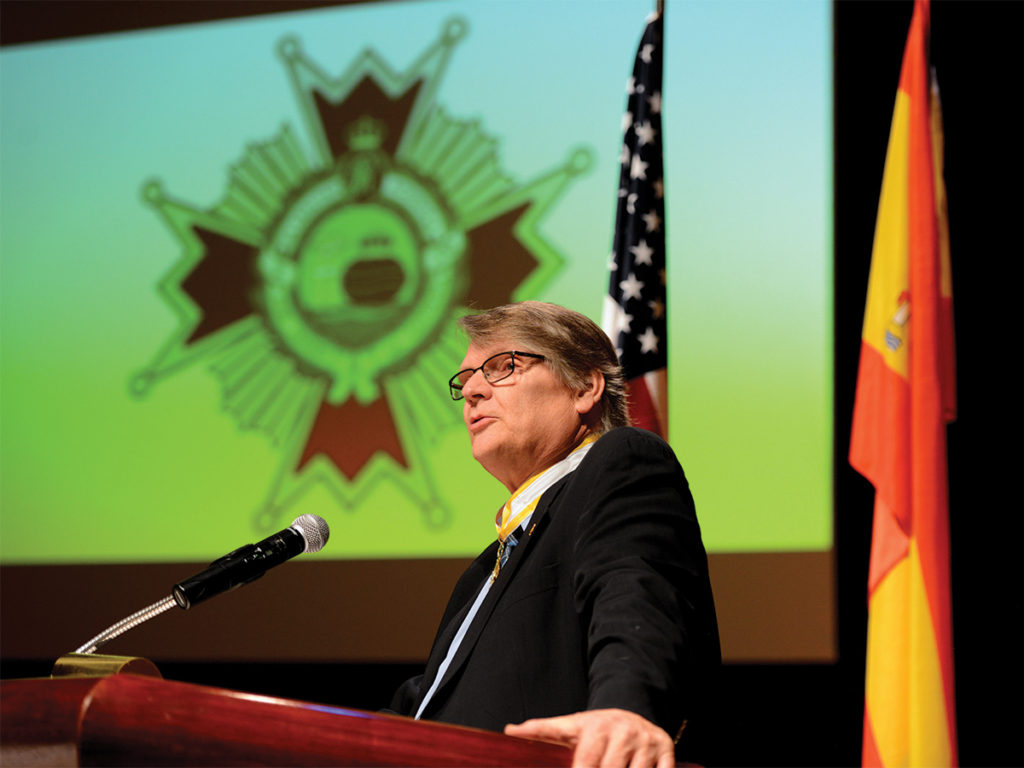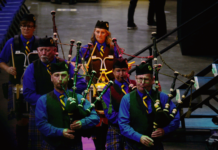
Professor Walter A. Clark speaking at his knighting ceremony, which took place in ARTS 166 on December 2, 2016.
UC Riverside Musicology Professor Walter A. Clark is making international headlines after being conferred knighthood from Spain in June of 2016. Though, prior to earning his title as knight commander, Clark had already gained admirable recognition from both students and staff as a dedicated professor at UCR for 13 years in which he has taught a wide range of courses such as western classical music and representations of Spain in music and dance. He has released numerous research publications about Spanish and Iberian music and serves as the editor-in-chief of the Grove Dictionary of Latin American and Iberian Music. In 2004, he founded the Center for Iberian and Latin American Music at UCR, therefore cementing his legacy cultivating, studying and teaching Latin American and Spanish music at UCR for as long as the university strives to uphold diversity and cultural embracement.
As part of our “Word of Advice” series, we sat down with Professor Clark to discuss his 50 years of research in the field of Spanish music studies and offer advice for students interested in pursuing a career within music and art history.
The discussion has been lightly edited for clarity.
Jasmine: First and foremost, congratulations on recently being knighted by Spain for your contributions to Spanish and Latin American music. Do you have a preference as to whether or not you are addressed by the title of “Lord”?
Prof. Clark: Absolutely not. The knighthood is an indication of my contributions to the research of Spanish music and the Spanish government recognizing my work within their culture. Aside from all of that, I’m still Walter. I haven’t changed at all.
Jasmine: Starting with the roots of those groundbreaking contributions that you mention, I believe I read that it was at 14 years old when you decided you wanted to dedicate your life to playing and studying Spanish music. Can you describe the first encounter that you ever had with Spanish music that you can remember?
Prof. Clark: It was in 1966, which was during the golden age of rock and right at the height of The Beatles and Bob Dylan. At the time I was beginning to study rock guitar and country, but the moment I heard flamenco music, that was it: It was like a conversion experience.
Jasmine: Would you say that your interest in this type of music was particularly unique to your peers growing up or was it cultivated in your surrounding social sphere?
Prof. Clark: Yes, I would say it was accepted in my peer group but it was unique. I remember taking a girl out on a date to see a flamenco performance, and she was a bit mystified by the whole thing. That was our first and last date so I guess that it did make me a little strange. But oddly enough, I was actually encouraged by my parents to continue playing this type of music because they thought that was at least better than rock and roll. It seemed like the end of the world with The Beatles and their long hair and everything making waves in the United States. So my parents would have at least wanted me to stay with the classical guitar, playing Spanish-style music, rather than the kind of music bands like The Beatles were playing.
Jasmine: How did you decide that you wanted to pursue a career in music history?
Prof. Clark: I was first and foremost a musician and I spent much of my graduate experience at UCSD studying guitar performance with Pepe Romero, a world-famous guitarist. In two years I earned my master’s degree and went to Europe for two years on a Fulbright scholarship, but I was never good enough to become a concert guitarist. I had always loved music and art and culture and history and language and writing and then it dawned on me: The only place where all of those interests intersect is music history. So I applied to the doctoral program in musicology at UCLA because one of the leading Hispanists in the world was on their faculty — Robert Stevenson — and he became my advisor and he encouraged me to write a dissertation on Spanish music. And that dissertation has become the basis and foundation for numerous books I wrote after that and all of my research later on.
Jasmine: Out of curiosity, how many instruments do you know how to play?
Prof. Clark: I know how to play two well: Tuba and guitar. I began with the tuba for my high school band and was never too interested in it until one day the teacher told me I was lazy. Since then I practiced early every morning just to prove the professor wrong — because gosh did that bother me. Eventually I became good at it but my main interest was always in guitar. Just to add some flavor to this: It wasn’t until college when I started dating a girl named Louise, though nothing ever came of us, when I decided to focus on guitar. She loved it when I played the guitar, and I’m not sure if I would have decided to go that route if it weren’t for her.
Jasmine: What do you focus on when writing about Latin American classes as well as when teaching your classes at UCR?
Prof. Clark: Pleasure. If nothing that you work on gives you pleasure, there’s no point in doing it. And when I conduct my research, I try to find where pleasure and the frontiers of our knowledge intersect. I believe that the more you know about something, the more you will come to enjoy it. It’s never that something is boring: It’s simply that you don’t understand it enough. If you sit someone down to listen to Beethoven’s Fifth Symphony and say, “Here, appreciate it,” they won’t. But after they take a course on Beethoven or music appreciation, they will learn about the structures, the melodies, what Beethoven was trying to say about his life and about the times in which he was living. Then the lights go on, and you will realize, “He is actually trying to say something and what these sounds mean, why he organized them the way he did: Now this speaks to me.”
Jasmine: Has your experience teaching at UCR been different, if applicable, ever since being knighted?
Prof. Clark: No. My interactions with people have not changed. A part of me is incredibly honored to have received recognition from the Spanish people themselves — I mean, this is like the highlight of my 50 years of research and my life — but the other part of me thinks it’s sort of silly. I’m sitting here wearing a worn-out pair of jeans, a baggy red sweater with a hole in it and a red T-shirt inside to hide the hole. I don’t even take myself seriously sometimes.
Jasmine: Why have you decided to continue your career at UCR for the past 13 years?
Prof. Clark: By encountering other cultures and other ways of looking at the world, we increase our understanding of our own condition and who we are and what we have come to know, and that applies to all studies. Learning from my students and being surrounded by such abundant diversity enriches my life and it increases my understanding of the world and my knowledge about myself. I once had a colleague named Elizabeth Kuznesof at The University of Kansas and I asked her: “Elizabeth, why did you get into the study of Brazilian colonial history with a name like ‘Kuznesof’?” and she said, “Because by delving into a culture completely different from my own, I understood myself better.” And that is the ultimate value of diversity and why I like being at UCR.








